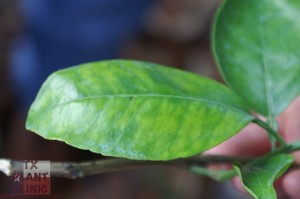
HLB Symptom: mottling
A few minutes ago, I got an email from a colleague requesting to post the following email from Bret Erickson of Texas Citrus Mutual in regards to dormant sprays for the Asian Citrus Psyllid. This is primarily directed to our citrus growers in the Rio Grande Valley. If this caught your attention, check out the HOT TOPIC page on Citrus Greening for more information about these psyllid and the disease that they vector. And if you know a producer, pass the word along.
Thanks.
January 5, 2012
Dear Citrus Growers and Grove Managers,
So far this winter, we have been fortunate to have received some much needed moisture, with accumulations near 3” in some areas after a few slow drizzles during the last month or so. Although we still need more rain, the precipitation, combined with the mild temperatures has promoted flush production and psyllid activity in some groves around the valley. This is a reminder that getting your dormant psyllid sprays done is extremely important.
We have seen a number of challenges which have hampered the area wide psyllid spray efforts during our first dormant spray window. High winds, irrigation, and harvest operations have all had an impact on citrus grower’s ability to complete their first dormant psyllid sprays. Although these challenges are part of the reality we are faced with, we want to remind all growers that reducing psyllid populations to as close to zero as possible is our best tool for preventing the introduction and spread of the deadly citrus greening disease, also known as HLB. Please remember, it was only a few months ago that an HLB infected psyllid was found in General Teran, Mexico, only 130 miles directly to our south. The threat is near. If you were unable to spray your trees during the first dormant spray, we encourage you to please spray them now.
Numerous folks are reporting that our citrus acreage may not have achieved true dormancy this winter, and there are ongoing reports of flush development and psyllid activity now. Even if you sprayed during the first window, please monitor your groves for psyllid activity. If you see psyllids, DON’T WAIT TO SPRAY!! Just as important as the date range for dormant sprays is active scouting, communicating with your neighbors, and killing psyllids now. Be proactive and monitor your groves!!! Also, don’t just rely on visual checks or traps, encourage your scouts to get out in the grove and do some tap sampling. Research has shown that during the winter months, psyllids are more likely to move inside the canopy and not be as mobile. The second dormant spray window is fast approaching and scheduled for January 16 thru February 6 for the entire Rio Grande Valley. As you may recall, the valley is divided into a Western Zone 1 (West of 281) and Eastern Zone 2 (East of 281). Although the window for the entire valley is the same, we ask that citrus producers to consider these zones, coordinating with their neighbors and working from the western valley to the eastern valley, and spraying in a methodical and tight timeframe. Talking to your neighbors and spraying in a coordinated fashion allows you to get the most effectiveness for killing psyllids in your particular neck of the woods, which in turn provides your groves with the best defense in terms of HLB prevention.
As a reminder, if you sprayed during the first dormant spray and have not yet reported your acres, you can report them online at www.texascitrusgreening.org or you can call (956) 584-1772 to report your sprayed acres. This reporting information also applies to those who had to spray late, in between the first and second windows, and for those who will be spraying during the second window. If you sprayed at all, please let us know.
Thanks to your efforts, the past year’s overall psyllid populations have been at their lowest recorded levels. With Spring fast approaching, it is imperative that you conduct your area wide psyllid spray to help continue this trend and avoid the potential for significant psyllid population explosions.
If you have questions regarding the area wide psyllid program, recommended insecticides, or questions about proper tap sampling methods, please call Bret Erickson at TCM at (956) 584-1772, or Dr. Mamoudou Setamou at the TAMUK Citrus Center in Weslaco at (956) 447-3370.
Best Regards,
Bret Erickson
Texas Citrus Mutual



